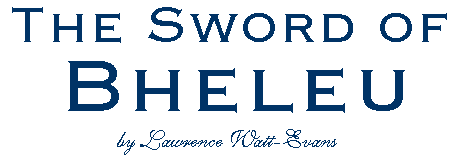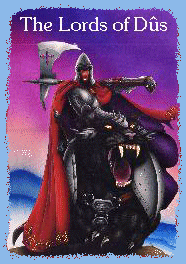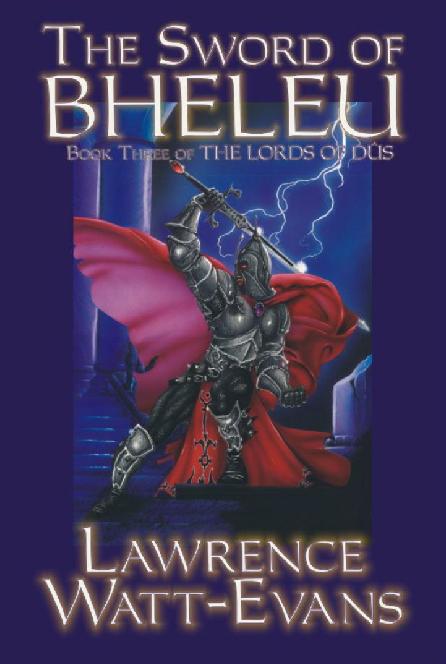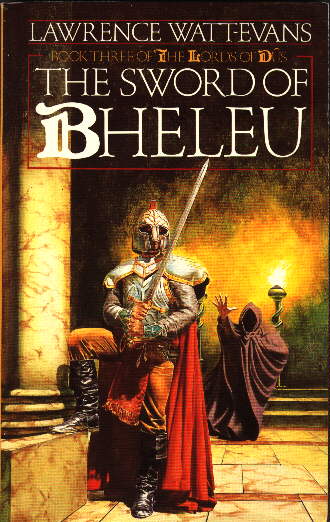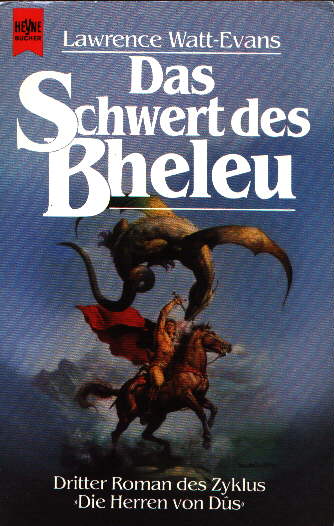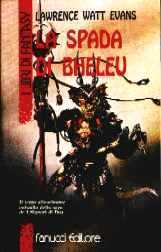Volume 3
The Sword of Bheleu is the third volume in the four-part "The Lords of Dus" series. There are no spin-offs or related series outside the original four novels and the appendices, nor are any presently in the works, but the possibility of adding some eventually hasn't been ruled out.
About the novel:
- Copyright 1982 by Lawrence Watt Evans
- First published January 1983 by Del Rey Books, ISBN 0-345-30777-1, with cover art by Laurence Schwinger. This edition included one appendix, "Glossary of Gods Mentioned in the Text."
- Reprinted with ISBN 0-345-33962-2, ISBN 0-345-34101-5, and maybe others. There are at least five printings.
- Second edition June 2002 by Wildside Press, ISBN 1-58715-625-3, with cover art by Dalmazio Frau . Includes three appendices -- "Glossary of Gods Mentioned in the Text," "A History of This Novel," and "The Histories of Garth of Ordunin, Written and Unwritten."
- An e-book edition was released November 2010.
- This novel is also included in the four-in-one hardcover omnibus The Lords of Dûs, Wildside Press, ISBN 1-58715-665-2.
So far, this page contains or can take you to the following items:
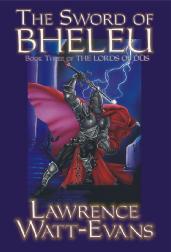
- The cover of the second edition. (To the right; click on the cover image to see it full-size.)
- Online booksellers I know to be offering it, including the publisher.
- An explanation of how I came to write the story in the first place.
- The opening of the first chapter, to serve as a teaser.
- A FAQ about the series.
- A page for The Lure of the Basilisk, the first book in the series,
- A page for The Seven Altars of Dusarra, the second book in the series,
- A page for The Book of Silence, the fourth and final book in the series,
- A page about the series and the four-in-one hardcover omnibus The Lords of Dûs.
- A publishing history of The Sword of Bheleu.
- An assortment of exits.
Click here to return to  the top of the page.
the top of the page.

Origins
There were four major sources for The Sword of Bheleu. Three of them were stories in my original series outline, back when I thought Garth would be the hero of a series of short works -- stories I never wrote.
In my original plans most of the stories were intended to be about Garth running various errands for the Forgotten King, but there were two that were not. These two were instead going to center on other people reacting to Garth's actions and the Forgotten King's plans.
One of them, "Skelleth," would have dealt with the Baron of Skelleth learning that there's a powerful overman running errands for a mysterious magical character in his village, and wanting a piece of the action.
The other, "The Decision of the Council," would have dealt with the other magicians in the world responding to the discovery that someone is upsetting, stealing, destroying, or destabilizing various important magical artifacts.
Another story, "The Fall of Fortress Lagur," would have involved Garth running an errand, but would also have included material about the relationship between Garth and the City Council of Ordunin.
The actual impetus for what became The Sword of Bheleu, though, was the way The Seven Altars of Dûsarra had worked out. In writing the novel I had made the Sword of Bheleu more powerful than I had originally intended it to be, and had thrown in a bunch of background that all fit in with what I'd planned, but which wasn't part of the scheme I'd started with. The system of ages, the identity of the Forgotten King, the vendetta by the cult of Aghad -- that had all been added, and once I'd set it up I couldn't really ignore it. It was obvious that the third book in the series had to deal with the Sword, and with Garth's relationship to the gods -- and it made sense to me to take those three stories about Garth's relationships with other powers and add them to the mix, combining everything into a single package.
So I did. The Sword of Bheleu starts off with a blend of what would have been "Skelleth" and "The Fall of Fortress Lagur" -- though I completely removed Lagur itself, and the errand the King would have sent Garth on -- and then segues into "The Decision of the Council" to finish out the book. The working title was, in fact, The Decision of the Council, partly because I thought calling a fantasy novel The Sword of [invented name] was a dreadful cliché, but Lester del Rey was of the very definite opinion that that "Sword of" formulation had become a cliché because it works, and that "The Decision of the Council" was static and dull. Thus, The Sword of Bheleu it became, even though nobody can pronounce "Bheleu." It is, in fact, the only one of all the hundreds of names I've invented that I invariably have trouble pronouncing correctly.
Click here to return to  the top of the page.
the top of the page.

The Sword of Bheleu
Chapter One
Galt, the overman trader, shifted uncomfortably, sending a rivulet of cold rain down the back of his neck and under his mail; it soaked into his quilted gambeson and trickled slowly down his furry back, chilly and damp and thoroughly unpleasant. He suppressed a growl. The itching of the armor was quite bad enough without this added discomfort. He wondered how warriors could stand to wear the stuff day after day. Despite the padded undergarment, he was quite sure that he had acquired several scrapes and scratches from the metal links, and nothing he had tried had alleviated the itching. He suspected that he was allergic to the quilting.
Wearing the mail was bad enough; the added annoyance of drenching rain during his watch had him ready to give up the whole venture. And what was he, the co-commander, doing standing watch in the first place?
Packing up and going home would undoubtedly be the sensible thing to do, he told himself; Kyrith, however, didn't see it that way. She had insisted on this ridiculous siege, and that meant he was stuck here. The City Council would never forgive him if he left her here unsupervised, in sole command.
In truth, though, he knew he didn't provide much supervision; there was no doubt that, whatever their nominal status, Kyrith was in charge and he was not. She was all fire and drive and fury, despite her handicap, while he had been restrained and reasonable. It was no wonder at all that anyone fool enough to have volunteered for this all-volunteer force would prefer to follow an aggressive idiot, a warrior and the wife of a warrior prince, rather than a quiet, calm trader.
He blinked rainwater out of his great golden eyes and pulled his cloak more closely about him; with his free hand he removed his broad-brimmed hat, shook off what he could of the accumulated rain, then jammed it back on his head. He glanced behind him at the dark shapes of the camp tents, black humps against the gray-black sky. The rain had put out the last trace of the campfires, and the last lantern had been extinguished hours ago. The old Wasteland Road was invisible in the darkness and the northern hills too distant to see through the falling rain. A gust of wind swept water into his face, and he snorted, blowing the moisture out of his slit nostrils. Those ugly noses the humans had apparently had some use after all; they kept out the rain. There were plenty of advantages to being an overman, though, and on balance he felt his species came out ahead. The very word for his kind implied as much, of course. He looked about, peering through the rain and the darkness.
Immediately to his right waited the warbeast he had been assigned, its flank less than a yard away; its eyes were closed, either in sleep or to keep out the rain, he was unsure which. Its glossy black fur blended with the night sky and the darkened plain, so that it seemed almost a phantom, its edges indistinct, as if it were only a vague outline of an animal. Its triangular ears were laid back against its skull, smoothing its already sleek shape still further; its pantherlike tail lashed silently from side to side. Galt knew that most cats disliked water -- very few overmen kept pets, but he had seen them aboard the trading vessels out of Lagur -- and he wondered if the creature was as miserable as its feline forebears would have been if forced to stand in pouring rain for hours on end. He was not familiar with warbeasts, and could not tell from its face or its actions; to him it seemed as calm and impassive as ever, save for the motion of its tail.
To his left was empty plain; several yards away a dark shape rose up against the night sky where some human farmer had built his home. Somewhere beyond that, lost in the gloom, he knew there was another overman standing watch with a warbeast ready at his side.
Ahead of him, perhaps a hundred yards away, stood the ruined wall of the town of Skelleth, and the fallen towers that marked its North Gate. A pale flicker of light reminded him that some unfortunate human was also stuck with watch duty, but that man, whoever he was, at least had the comfort of a fire and whatever shelter was provided by the one tower wall that still stood.
Galt envied the man his fire. Even if he had had enough dry fuel to keep a fire going, he would not have dared to light one; it went against policy and good sense in so underequipped a siege as this one. The enemy forces could use such fires to locate the sentries, making it that much easier to send spies out between them, and to smuggle supplies in.
The firelight flickered oddly, and Galt's attention was drawn to it briefly, but he dismissed it as unimportant. The guard had probably walked in front of it, stretching his legs, no doubt.
The light flickered again, and then seemed to brighten. Galt blinked rain away and peered at it more closely.
It was brighter; in fact, there were now two lights, and one was moving. The watch fire remained where it was; the increase in brightness had been the addition of this new light, whatever it was. He watched and listened carefully.
The new, smaller light was slowly approaching. Galt stirred uneasily, sending another trickle down his back, and his right hand closed on his sword hilt. The light was definitely coming closer. Although it was hard to be sure through the hissing rain, he thought he heard boots sloshing through mud. He patted the warbeast's side, then returned his hand to his sword and loosened the blade in its scabbard. The warbeast's eyes opened, gleaming a ghostly pale green in the dimness as they caught the faint light; its tail stopped lashing. Galt took a step forward.
He had forgotten the added weight of his armor and that he had been standing in mud for several long minutes without moving his feet; there was a soft sucking sound as his boot came free, though the motion required little more effort than it would have ordinarily.
The light suddenly stopped moving, still at least a dozen yards away; there was an instant of silence, save for the pattering of the rain, and then a voice called softly, "Overman?"
Click here to return to  the top of the page.
the top of the page.

Publishing History:
First published January 1983 by Del Rey Books, ISBN 0-345-30777-1. Cover art by Laurence Schwinger. Del Rey produced at least four additional printings.
The second edition was published June 2002 by Wildside Press, ISBN 1-58715-625-3, as a print-on-demand trade paperback. The cover art is by Dalmazio Frau .
The novel is also included in the four-in-one hardcover omnibus "Lords of Dus", Wildside Press, ISBN 1-58715-665-2.
- Foreign editions:
British edition published 1987 by Grafton Books, ISBN 0-586-07151-2. Cover art by Kevin Tweddell.
German edition, Das Schwert des Bheleu, published 1988 by Wilhelm Heyne Verlag, ISBN 3-453-00998-3. Translated by Joachim Pente. Map redrawn by Christine Goebel. Presented by Wolfgang Jeschke. Cover art by Boris Vallejo.
Italian edition, La spada di Bheleu, published 1992 by Fanucci Editore, ISBN 88-347-0364-2. Translated by Carla Borrelli. Presented by Gianni Pilo. I don't seem to have a record of who did the cover.
Click here to return to  the top of the page.
the top of the page.

Frequently-Asked Questions about The Sword of Bheleu
Well, actually, I'm just providing, not a FAQ about The Sword of Bheleu, but...
Frequently-Asked Questions about "The Lords of Dus"
- 1. The single most-often asked question: Will I ever write any more about Garth?
- I honestly don't know. I did plot a fifth novel, back in 1983, but Del Rey never expressed any interest in it, so I never wrote it. I have no plans to do so. However, if Asimov could write more Foundation stories twenty or thirty years later, I'm not about to rule out writing more about Garth.
The remaining questions are all things that might be answered in that fifth volume if I ever wrote it; if you don't want to take even that one-in-a-million chance that I'll be giving away secrets you don't want to know, stop here.
- 2. Will Garth be accepted back into his homeland? He was an outcast at the end of the series.
- Not easily, but eventually.
- 3. Were all the members of Aghad's following dead?
- No. Dozens survived, scattered across the continent and disorganized by the loss of their central temple. They would make sporadic attempts to regroup and to avenge themselves on Garth.
- 4. What changes have occurred in Garth's world as a result of the destruction of the Fifteen Gods?
- The lesser gods, the Arkhein, who survived, suddenly find themselves proportionately more powerful, and for a few years take the opportunity to interfere in human affairs more than before. Gradually, a new balance emerges and the gods become less whimsical once more.
Also, the laws of magic have changed. Much magic depended upon various gods, and therefore no longer works. Science, which really didn't work very well when the gods could change the rules at any time, does work--at least, when the Arkhein don't interfere.
Having the cycle of time broken, however, probably has the greatest effect on people. Under P'hul, everything anyone attempted was doomed to eventual slow failure. Under Bheleu, everything was destined to end in disaster. With the Dus gone and the Ages ended, this sort of predestination isn't there; plans can work or not work according to how well they were devised, or ordinary dumb luck. This means that the established order, which had decayed under P'hul and been largely destroyed by war under Bheleu, can finally be replaced by new organizations.
What those new organizations would be I can't really say; I hadn't worked out all the details yet. I suspect that the trading empire that Garth started at Skelleth would become a major power, that the Yprian invaders in Nekutta would become another, and that Eramma would fall apart into several small countries.
- 5. Will Frima be accepted as Baroness of Skelleth?
- Yes, eventually, because she has Garth with her to enforce her claim, and is pregnant with an heir. It would take some fighting to establish her position, however.
- 6. Will Garth achieve the immortal fame he has been seeking?
- No, not really, because nothing is truly immortal. He has, however, made changes enough in the world to content him, and will be remembered for a very long time indeed.
- 7. ??? Send me questions right here...
- And maybe I'll answer them.
Click here to return to  the top of the page.
the top of the page.



That's it; here's your list of handy exits:
The Misenchanted Page
Front Page | Main Site | E-mail me!
